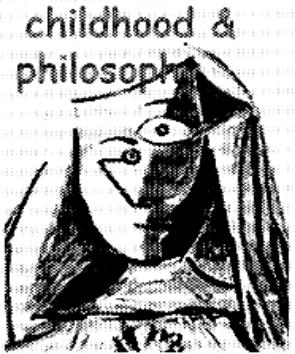uma conversa espiralada entre o terreiro e a ancestralidade: infância, comunidade e pertencimento
DOI:
https://doi.org/10.12957/childphilo.2025.89258Keywords:
childhood, ancestrality, community, spiral timeAbstract
The article presents a conversation between Professor Edna Olimpia da Cunha and Professor Wanderson Flor do Nascimento, held in the historic Pedra do Sal, in Rio de Janeiro, which discusses childhood from the perspective of African traditions and the ways of thinking of the “terreiros”. The dialog addresses spiral time and the figure of Exu, who, represented as a child, carries the collective memory and plays with time, connecting past and present. This perspective breaks with linear, Western views of childhood, recognizing children as living manifestations of ancestry. The notion of community is central to the conversation, being described as a historical and relational entity that precedes and sustains the individual. Education, in turn, is approached as a continuous, relational and collective process, rooted in community practices, orality and ethics. In the terreiros, ancestry is lived in the present, challenging neoliberal and colonial logics that fragment collectivity and prioritize individualism. The teacher highlights the political role of terreiros as spaces of resistance and formation, which integrate tradition, belonging and transformation. The practices value interdependence between community members, creating alternative ways of existing and educating. The continuity of this formative model, which questions hegemonic paradigms, depends on a political and community engagement capable of sustaining these ancestral forms of coexistence, memory and formation.
Downloads
References
FU-KIAU, Kimbwandende Kia Bunseki. O livro africano sem título: cosmologia dos Bantu-Kongo. Tradução de Tiganá Santana. Rio de Janeiro: Cobogó, 2024.
MARTINS, Leda Maria. Afrografias da Memória: o reinado do Rosário do Jatobá. 2. ed. Belo Horizonte: Mazza; São Paulo: Perspectiva, 2021a.
MARTINS, Leda Maria. Performances do tempo espiralar: poéticas do corpo-tela. Rio de Janeiro: Cobogó, 2021.
FLOR DO NASCIMENTO. Wanderson. Entre apostas e heranças: contornos africanos e afro-brasileiros na educação e no ensino de filosofia no Brasil. Rio de janeiro: NEFI, 2020.
NIETZSCHE, Friedrich. Assim falou Zaratustra: um livro para todos e para ninguém. Rio de Janeiro: Civilização Brasileira, 2010.
SANTANA, Tiganá. Temporalidades, história e memória. In: CARNEIRO, Natália et al. (orgs.) Insumo para ancoragem de memórias negras. São Paulo: Oralituras, Fundação Rosa Luxemburgo, Casa Sueli Carneiro, 2022. p. 43-53.
SANTOS, Antônio Bispo. Colonização, quilombos: modos e significados. 2. ed. Brasília: Ayó, 2019.
SOMÉ, Sobonfu. Welcoming spirit home: ancient African teachings to celebrate children and community. Novato, California: New World Library, 1999.



